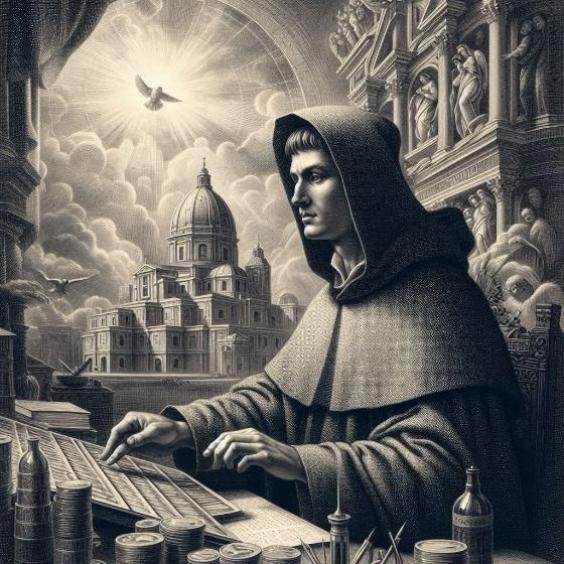Luca Pacioli, The Father of Accounting
If you've ever had to deal with columns of debits and credits, whether by choice or by necessity, you can thank (or curse) a man: Luca Pacioli. This curious Franciscan friar of the 15th century not only dedicated himself to praying and teaching mathematics, but also laid the foundations of something as essential to the modern world as accounting. But who was this character really? How did he become the "Father of Accounting"? Let's break down the story of this peculiar Renaissance genius, full of anecdotes and curiosities.

A friar with numbers in his head
Luca Pacioli was born in 1445 in a small Italian town called Borgo San Sepolcro, in the region of Tuscany. He was not exactly the type of person one would expect to see in a monk's habit. From a young age, he showed an exceptional talent for mathematics, which led him to study under the tutelage of a teacher named Domenico Bragadino in Venice.
Not much is known about his early life, but it is known that Luca was a passionate seeker of knowledge. When he was not praying, he spent his time writing, studying, and teaching. He became a Franciscan friar, but that did not prevent him from moving in the academic world of the time. He was a man of many talents: mathematician, teacher, friend of artists, and even collaborator of one of the greatest geniuses in history.
The connection with Leonardo da Vinci
In his life, Pacioli did something that many could only dream of: he became a close friend of Leonardo da Vinci. They met at the court of the Duke of Milan, Ludovico Sforza, at the end of the 15th century. Pacioli not only shared mathematical knowledge with Leonardo, but they also collaborated on several projects.
It is said that Leonardo was so fascinated by Pacioli's ability to explain geometric and mathematical concepts that he decided to illustrate many of the friar's works. Thanks to this collaboration, Pacioli published a book in 1509 called De Divina Proportione, a treatise on mathematics that explored the golden ratio and geometry, with illustrations by Leonardo himself. Who would have thought that behind those drawings of polygons and perfect figures was the creator of the Mona Lisa?

The masterpiece: Summa de Arithmetica
But what really catapulted Luca Pacioli to fame was not his friendship with Da Vinci, but his book Summa de Arithmetica, Geometria, Proportioni et Proportionalita, published in 1494. This book was a kind of mathematical encyclopedia of the time. It contained everything a merchant or banker of the Renaissance needed to know to manage their finances and businesses.
The most revolutionary thing about the Summa was a chapter entitled "Particularis de Computis et Scripturis", in which Pacioli described for the first time the double-entry system, the accounting method still used today. According to this system, each transaction affects two accounts: one that is debited and another that is credited. That is, if you buy something, you not only record that you spent money, but you also register what you acquired in exchange. Thus, the balances always match. A genius!
A life of travels and teachings
Luca Pacioli did not limit himself to writing about accounting. During his life, he was a professor in various Italian cities, such as Rome, Perugia, Naples, Milan, Bologna, and Pisa. Wherever he went, he left his mark as a brilliant teacher of mathematics and finance.
It is said that his classes were quite a spectacle. Students not only learned to calculate and balance, but they also had fun with his explanations. Pacioli had a special gift for simplifying the most complex concepts and making them accessible to all. It is no wonder that he was considered the best teacher of his time.
Curiosities and anecdotes about Luca Pacioli
A very mathematical friar: Unlike many of his contemporaries, Pacioli was not a cleric by vocation. In fact, he became a friar to be able to dedicate himself fully to his studies and teach without the mundane concerns of a lay citizen. The Franciscan habit allowed him to move around different cities and universities as a recognized scholar.
The man who knew too much: The Summa de Arithmetica was not only about accounting. It included sections on algebra, geometry, and proportion theory. However, it was accounting that gave him fame, although poor Luca never received a single ducat for his work. The Summa was intended as a textbook, not as a bestseller.
Controversies: Pacioli was accused of not being original and of basing his works on ancient texts by Arab and Indian mathematicians. In his defense, Pacioli always said that his merit was not invention, but the clarity with which he presented ideas. In short, he was more of a disseminator than an inventor.
Why is he called the "Father of Accounting"?
The reason is simple: Pacioli was the first to systematize and write about accounting as a structured discipline. His double-entry method has been improved, but the basic principles remain the same as he described more than 500 years ago.
The Summa became the mandatory manual for merchants and bankers in Europe. Even today, accounting students must learn the principles of double-entry, where "debit" and "credit" become the bread and butter of the day.
Pacioli's legacy
Luca Pacioli died in 1517, leaving an indelible legacy in the world of accounting and mathematics. His teachings not only helped organize the economy of the time, but also established the basis for the growth of modern businesses. The system he invented is still in use today, being used in every corner of the world, from small shops to large multinational corporations. So, the next time you have to balance or square accounts, remember the friar who started it all and smile (or cry). Thank you, Luca Pacioli, for turning accounting into an orderly science!
Luca was not just a mathematician or a friar; he was a true visionary, a man ahead of his time who knew how to see the need to put order in the financial chaos of the Middle Ages. That is why, more than half a millennium later, his name still resonates in every accounting office and every Excel sheet.





